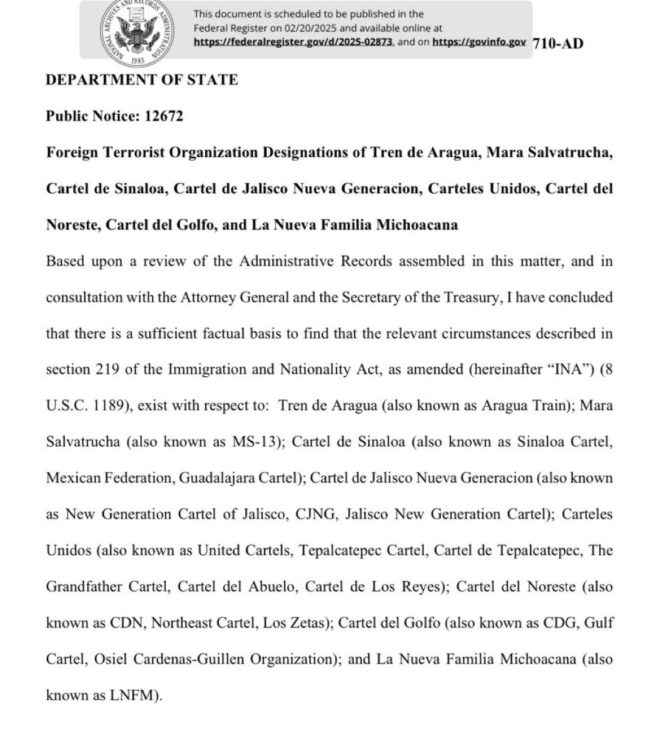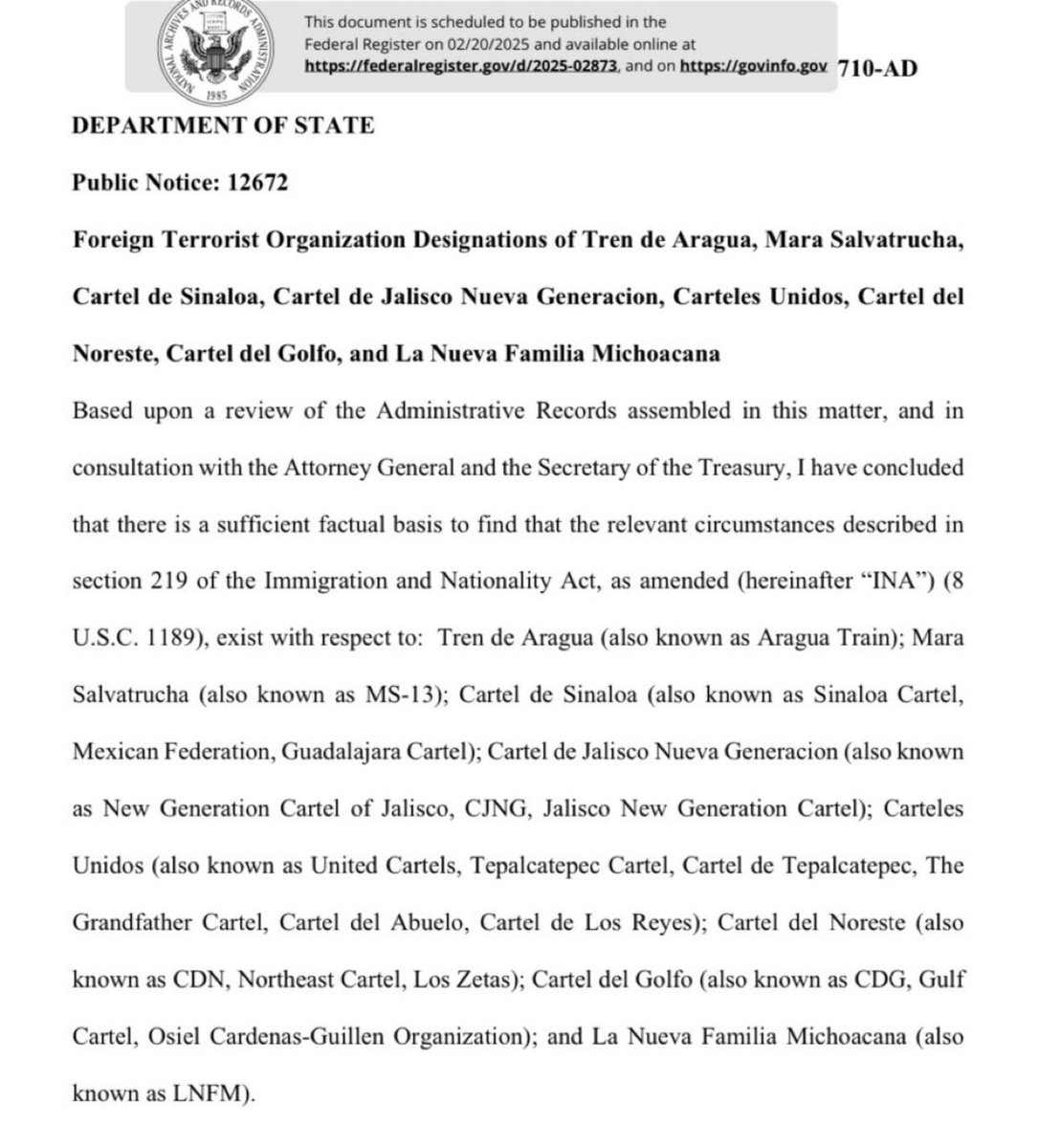
Overview of the US Declaration of Cartels as Foreign Terrorist Organizations
On February 19, 2025, a significant announcement was made by the United States government, declaring several drug cartels as foreign terrorist organizations. This declaration marks a critical shift in the approach taken by the U.S. in combating drug-related violence and organized crime, specifically targeting the powerful drug trafficking organizations that have long plagued both the U.S. and Mexico.
Background on Drug Cartels
Drug cartels are highly organized, multinational criminal organizations that engage in the production, distribution, and sale of illegal narcotics. These groups often use extreme violence and intimidation tactics to maintain control over their territories and operations. The Mexican drug cartels, in particular, have gained notoriety for their brutal tactics, including assassinations, kidnappings, and violent confrontations with law enforcement and rival organizations.
The cartels have a significant impact on both sides of the U.S.-Mexico border, contributing to the ongoing drug epidemic in the United States and the destabilization of communities in Mexico. As the demand for illegal drugs continues to rise, these organizations have grown in both power and influence, making it increasingly difficult for authorities to combat their operations effectively.
The Significance of the Declaration
The declaration of certain cartels as foreign terrorist organizations (FTOs) is a pivotal moment in U.S. policy towards drug trafficking and organized crime. Traditionally, drug cartels have been classified primarily as criminal organizations rather than terrorist groups. However, the recent classification reflects a recognition of the severe and violent tactics employed by these organizations, which often resemble those of terrorist groups.
- YOU MAY ALSO LIKE TO WATCH THIS TRENDING STORY ON YOUTUBE. Waverly Hills Hospital's Horror Story: The Most Haunted Room 502
By labeling these cartels as FTOs, the U.S. government gains additional legal tools and resources to combat their operations. This designation allows for more stringent sanctions and measures, including freezing the assets of these organizations, prohibiting U.S. citizens from doing business with them, and enhancing cooperation with international law enforcement agencies.
Implications for U.S.-Mexico Relations
The decision to classify drug cartels as foreign terrorist organizations has significant implications for U.S.-Mexico relations. Historically, the U.S. has worked closely with Mexican authorities to combat drug trafficking and organized crime. However, this new designation may alter the dynamics of this partnership.
The Mexican government has been engaged in a long-standing battle against drug cartels, often facing criticism for its handling of the situation. The U.S. declaration may lead to increased pressure on the Mexican government to take more aggressive action against these organizations. Additionally, it may result in greater U.S. involvement in Mexico’s internal security issues, raising concerns about sovereignty and the effectiveness of such interventions.
The Role of Law Enforcement Agencies
The declaration empowers U.S. law enforcement agencies to enhance their efforts in tracking and dismantling these cartels. Agencies such as the Drug Enforcement Administration (DEA) and the Federal Bureau of Investigation (FBI) are likely to intensify their operations aimed at disrupting the financial networks and logistical operations of these organizations.
Moreover, the designation as FTOs may facilitate greater intelligence sharing between the U.S. and international partners, leading to more coordinated efforts to combat drug trafficking on a global scale. Collaborative efforts between U.S. and Mexican law enforcement may be strengthened, focusing on joint operations and intelligence-gathering initiatives.
Challenges Ahead
Despite the potential benefits of this designation, challenges remain. Drug cartels have proven to be highly adaptable and resilient, often finding ways to circumvent law enforcement efforts. The complexity of their operations and the vast resources at their disposal make it difficult to eradicate these organizations entirely.
Additionally, the classification of cartels as terrorist organizations may lead to unintended consequences. It risks escalating violence as cartels may retaliate against law enforcement and rival gangs. The potential for increased violence raises concerns about the safety of civilians in affected areas.
Conclusion
The U.S. declaration of several drug cartels as foreign terrorist organizations represents a significant shift in the government’s approach to combating drug-related violence and organized crime. This designation provides law enforcement with more tools to tackle the growing threat posed by these powerful organizations. However, the implications for U.S.-Mexico relations, the challenges of effectively combating these groups, and the potential for increased violence must be carefully considered.
As the U.S. moves forward with this new strategy, it will be crucial to balance the need for effective law enforcement with the safety and stability of communities affected by cartel violence. The ongoing fight against drug cartels will require cooperation, innovation, and a comprehensive approach to address the root causes of drug trafficking and related violence.

JUST IN: The US just officially declared several cartels as foreign terrorist organizations. pic.twitter.com/5eAmOg15qj
— Eric Daugherty (@EricLDaugh) February 19, 2025
JUST IN: The US just officially declared several cartels as foreign terrorist organizations.
It’s not every day that we hear news like this, but the recent declaration by the United States government that several cartels are now classified as foreign terrorist organizations is indeed significant. This move sends a strong message about the seriousness with which the U.S. is taking the threat posed by these criminal organizations. The announcement not only highlights the growing influence and danger of these cartels but also sets the stage for potential changes in policy and law enforcement strategies. So, what does this mean for the U.S., Mexico, and the global community?
Understanding the Implications of the Declaration
By labeling these cartels as foreign terrorist organizations (FTOs), the U.S. government is taking a hard stance against their operations. This classification allows for a broad range of actions, including the freezing of assets, enhanced law enforcement cooperation, and increased intelligence sharing. The implications are profound, particularly for communities that have been suffering under the violence and control of these groups. With this designation, the U.S. aims to undermine the financial and operational capabilities of these cartels, making it harder for them to operate and expand their influence.
The Growing Power of Cartels
Over the past few decades, drug cartels have evolved from simple trafficking operations to complex, highly organized entities that engage in various criminal activities, including human trafficking, extortion, and even terrorism. Their ability to operate across borders poses significant challenges for law enforcement agencies. The U.S. has long recognized the threat posed by cartels like the Sinaloa and Jalisco New Generation cartels, but this recent declaration elevates the seriousness of the issue. The U.S. government is making it clear that these organizations will not be tolerated and that their activities will be met with serious repercussions.
What Led to This Declaration?
The decision to classify these cartels as FTOs comes after years of escalating violence and increasing drug-related deaths in the U.S. According to the Centers for Disease Control and Prevention (CDC), drug overdose deaths have reached alarming rates, primarily fueled by the influx of fentanyl and other synthetic opioids. The cartels have been instrumental in the trafficking of these dangerous drugs, leading to a public health crisis that the U.S. can no longer ignore. This declaration is a response to the urgent need for a more aggressive approach to combat these organizations.
The Impact on Law Enforcement and Policy
With the new designation, U.S. law enforcement agencies are expected to enhance their strategies to combat these cartels. This could mean more resources allocated to intelligence operations, increased collaboration with Mexican authorities, and a focus on dismantling the financial networks that sustain these organizations. The hope is that by targeting the financial underpinnings of the cartels, the U.S. can disrupt their operations significantly.
International Cooperation
This declaration also emphasizes the need for international cooperation in combating drug trafficking and cartel violence. The U.S. has historically worked with Mexico and other Latin American countries to tackle these issues, but the challenges remain immense. By officially labeling these cartels as terrorist organizations, it reinforces the notion that this is a global problem requiring a concerted effort. Countries in the region may need to reassess their strategies and collaborate more closely with U.S. authorities to effectively address the threat.
The Reaction from Mexico and Other Countries
Responses from Mexico have been mixed. While some officials may welcome the increased attention and support from the U.S., others may view it as an infringement on sovereignty. There is an ongoing debate about the most effective strategies to combat cartel violence, and this declaration could spark discussions on military involvement or other drastic measures. Mexico has been grappling with its own internal struggles against these powerful organizations, and U.S. support will be crucial in tackling this pervasive issue.
What This Means for Communities
For communities directly affected by cartel violence, this declaration could bring a sense of hope. Residents living under the threat of cartel violence have long awaited decisive action from their governments. The possibility of increased security and reduced violence is a pivotal concern for many. However, it is also important to note that such a declaration may lead to retaliatory actions from the cartels, which could exacerbate violence in the short term. The U.S. and Mexico must prepare for the potential fallout from this declaration and ensure that protective measures are in place for vulnerable communities.
The Role of the Public
Public awareness and engagement are crucial in the fight against drug cartels and their violence. As citizens, understanding the dynamics at play can empower communities to advocate for policies and strategies that prioritize safety and justice. Education about the issues surrounding drug trafficking and cartel violence can help demystify these organizations and encourage community action. Whether through supporting local initiatives or participating in discussions about public safety, every effort counts in the collective fight against these dangerous entities.
Looking Forward
While the declaration of cartels as foreign terrorist organizations is a significant step, it is not a panacea for the complex issues surrounding drug trafficking and cartel violence. Both the U.S. and Mexico will need to remain vigilant and adaptive in their approach, learning from past mistakes and building more robust frameworks for cooperation. The fight against these organizations will require sustained effort, innovative strategies, and, most importantly, the involvement of local communities. Only then can we hope to see lasting change and a reduction in the grip that these cartels have on society.
The Broader Context
This declaration also fits into a more extensive narrative about drug policy and global security. As different countries grapple with their own drug crises, the international community must consider the implications of drug trafficking and cartel violence. The interconnectedness of global crime necessitates a unified approach, where countries share intelligence, resources, and strategies to combat these pervasive threats. The recent U.S. declaration could serve as a catalyst for broader discussions about how to effectively tackle the root causes of cartel power and influence.
Conclusion
The recent declaration by the U.S. government to classify several cartels as foreign terrorist organizations marks a pivotal moment in the ongoing battle against drug trafficking and cartel violence. It reflects a growing recognition of the serious threat these organizations pose to public safety, health, and international stability. While this declaration alone will not solve the issue, it opens the door for more focused efforts to dismantle these powerful entities and bring about meaningful change in affected communities. As we move forward, it’s essential to stay informed and engaged, recognizing that the fight against drug cartels is a collective responsibility.
